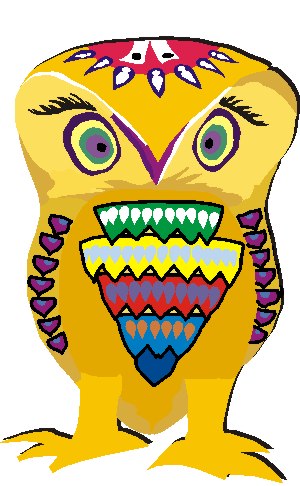Pohela
Boishak In Our Own Way!
By
Rashaam
Back
in class six, we woke up early in the morning, and were so excited,
that each of us woke up every single person in the house with cries
of "Shubho noboborsho!" Our mothers were forced to help
us wear the sari ('help' being an understatement).
Our school organized a mela, appropriately known as the Boishakhi
mela. Everything was planned, there would be a 'mukto moncho'-where
anyone could perform all throughout the day. We would dance, recite
poems, perform a play that we the students had written; juniors and
seniors together! Even though it was supposed to start at ten, the
school-ground was full by nine-thirty! We were all 'sheccha sheboks',
which meant that we would take turns in assigned stalls, at that time
we considered this to be a major honour, after all we were handling
money (even though they were coupons).
 All
the boys wore pure white panjabis, and the girls, the white saris
with red borders. The feeling of being in these outfits on such an
occasion was half the thrill. Then came the super-charged onstage
performances and people from all over the mela came and sang along.
The performances ended all too soon, but then another type of enjoyment
kicked in. We realized that there were so many stalls with such a
variety of food! So, we ate and ate. Kacha aam bhorta, pithas,
jhaal murri, moyas, panta bhaat, bhuna khichuri, tengra maach bhorta,
shutki bhorta, the list just goes on. Another hit item on the
menu was a product of 'globalization'- the brownie. In the sweltering
heat our thirst was quenched with lassi and fresh fruit juices! By
the end of the day, we were sun-burnt and tired, but we went home
happy with our faces painted, mehendi on our hands, and alta
on our feet. We weren't empty handed either! We had bought loads of
Bangladeshi traditional crafts!
All
the boys wore pure white panjabis, and the girls, the white saris
with red borders. The feeling of being in these outfits on such an
occasion was half the thrill. Then came the super-charged onstage
performances and people from all over the mela came and sang along.
The performances ended all too soon, but then another type of enjoyment
kicked in. We realized that there were so many stalls with such a
variety of food! So, we ate and ate. Kacha aam bhorta, pithas,
jhaal murri, moyas, panta bhaat, bhuna khichuri, tengra maach bhorta,
shutki bhorta, the list just goes on. Another hit item on the
menu was a product of 'globalization'- the brownie. In the sweltering
heat our thirst was quenched with lassi and fresh fruit juices! By
the end of the day, we were sun-burnt and tired, but we went home
happy with our faces painted, mehendi on our hands, and alta
on our feet. We weren't empty handed either! We had bought loads of
Bangladeshi traditional crafts!
Years
have passed and we still look forward to Pohela Boishakh with equal
amounts of hope and excitement. We run around hawkers and other markets,
trying to find the best taat or block print cotton saris. And even
though fotuas have made a strong entrance in the fashion
world, for the guys, pure white panjabis are still the 'in'
thing. Then plans about where to go on the big day are made well in
advance. And then, finally the day comes, and even though it's just
before the most important exams of our lives, we are out, enjoying
ourselves.
So
when people accuse us, the people of the younger generation, to be
out of touch with the culture of the Boishakhi utshob, it really hurts.
Yes may be we do not go to places like the traditional Ramna botomul
(it might be because our culture cum tradition torch- bearers, the
politicians cannot assure any kind of security). But we are finding
a way to express ourselves in Boishakh. We go to fabulous melas
organized by various schools, enjoy sweets distributed by different
stores and business houses while opening the new books of 'haalkhata'.
Of
course we enjoy a couple of shows: whether it's in the middle of a
road, or in parks. This day, everyone indulges in the consumption
of traditional food! No Helvetia or A&W! Dhanmondi Lake and various
places in Gulshan attract hordes of youngsters. And at the end of
the day, a growing number of us youngsters, have started organizing
rooftop get-togethers! Now these are loads of fun. In the evenings
a bunch of friends, cousins, (and sometimes, people we barely know)
show up. Most of the time, it's a potluck party, and bhortas
are found in abundance. And then we sing songs! Songs ranging from
the whole spectrum of the Bangladeshi music culture! We kick off with
the popular Boishakh songs, (which many people know how to play on
the harmonium), try our luck with a bit of Rabindro Shongeet, and
then move on to baul geetis! The baul geetis get everyone
on the mood, someone plays the dhol, and the guitar and tambourine
are fused with our traditional instruments. So our day ends, with
unforgettable memories, and with a sense of culture, and a renewed
sense of friendship, and with hope: Bangladesh will be fine!
I always feel
that the older generation unnecessarily worries about our Bengali
identity! So the next time, someone accuses us of not having a sense
of culture, tell them that deep down we are Bengalis, may be in a
different way! And we do enjoy and love the Boishakhi extravaganza!
